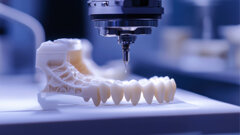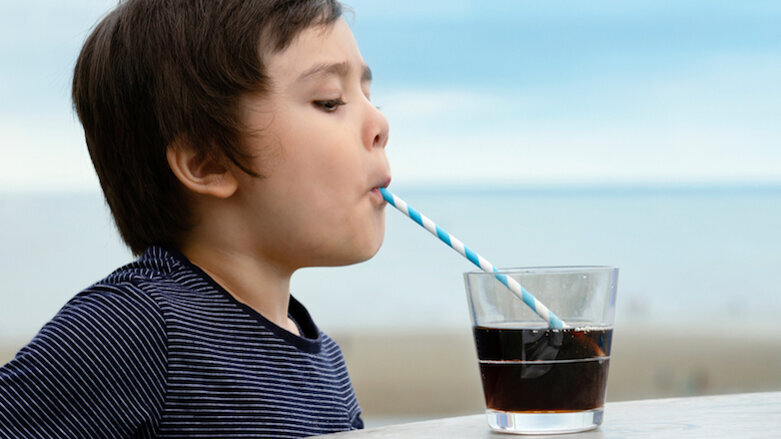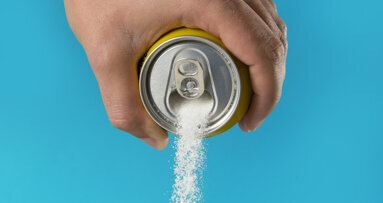NOTTINGHAM, UK: Given what we know about the relationship between rates of obesity and sugar consumption, it would seem to be common sense that children who consume more sugary drinks have a higher body mass index (BMI). It comes as somewhat of a surprise, then, that a new nationally representative survey of UK children has found no significant difference between the BMI of children who consume sugar-sweetened drinks and those who do not.
Researchers at the University of Nottingham led the study and analysed data from the National Diet and Nutrition Survey rolling programme, which featured 1,298 UK children aged 4–10 years old and was conducted between 2008 and 2016. This survey gathers information annually from food diaries in which children or their parents record their dietary intake over a four-day period, and collects the height and weight measurements of the children to calculate their BMI.
Though 61 per cent of the children were subsequently classified as consumers of sugary drinks, 78 per cent of this group did not exceed their total recommended daily calorie intake. Interestingly, although 78 per cent of all of the children overall consumed more than the recommended daily amount of added sugars, this figure was only 68 per cent for those who consumed sugary drinks.
“In this representative sample of UK children, high intake of added sugars was not directly correlated with high energy consumption. Therefore, relying on a single-nutrient approach to tackling childhood obesity in the form of a soft drink tax might not be the most effective tactic,” said Ola Anabtawi of the University of Nottingham, who led the research, in a press release regarding the study.
She added: “Our findings indicate that drinking sugar-sweetened beverages is not a behaviour particular to children with a higher body weight. On the contrary, framing sugar reduction in tackling obesity might reinforce negative stereotypes around ‘unhealthy dieting’.”
“Instead, policies should focus on those children whose consumption of sugar-sweetened drinks substantially increases their total added sugar intake in combination with other public health interventions,” she concluded.
The University of Exeter’s Dr Katarina Kos cautioned that the study’s findings should not be interpreted by parents as permission to give their children high-sugar drinks. “The study should not be seen as reassurance that we can relax about sugar-sweetened drinks, but as the authors also say, it highlights the complexity of the environment,” she told the Independent.
The findings of the study were presented at this year’s European Congress on Obesity, held in Glasgow in Scotland from 28 April to 1 May.
Tags:
WELLINGTON, New Zealand: Increased intake of sugar‐sweetened beverages (SSBs) is associated with a higher risk of Type 2 diabetes, cardiovascular disease,...
MELBOURNE, Australia: In an effort to deter people from smoking, cigarette packets are labelled with warnings and graphic images. In a new study, ...
SYDNEY, Australia: The underlying causes of central sensitisation disorders such as migraine and fibromyalgia are poorly understood. The gut–brain axis ...
MINNEAPOLIS, US: Since the election of Donald Trump as US president in 2024, the question of water fluoridation in the country has become increasingly ...
SINGAPORE: Excessive consumption of sugar-sweetened beverages (SSBs) can have a deleterious effect not just on oral health but on systemic health ...
MADRID, Spain/PORTO ALEGRE, Brazil: Although researchers have previously investigated and analysed the relationship between periodontitis and obesity, ...
NEW YORK, U.S.: Older adults with more harmful than healthy bacteria in their periodontal tissue are more likely to have evidence for amyloid beta— a key ...
LONDON, UK: The premature wearing of teeth due to dietary or gastric acids is the third most common dental condition after caries and periodontal disease. A...
MELBOURNE, Australia: In the first large-scale study to look at the oral microbiome, researchers from Murdoch Children’s Research Institute (MCRI) have ...
JOHANNESBURG, South Africa: In 2018, South Africa introduced a tax on sugar-sweetened beverages (SSBs) based on their respective levels of sugar content ...
Live webinar
Wed. 25 February 2026
8:00 pm EST (New York)
Live webinar
Tue. 3 March 2026
11:00 am EST (New York)
Dr. Omar Lugo Cirujano Maxilofacial
Live webinar
Tue. 3 March 2026
8:00 pm EST (New York)
Dr. Vasiliki Maseli DDS, MS, EdM
Live webinar
Wed. 4 March 2026
12:00 pm EST (New York)
Munther Sulieman LDS RCS (Eng) BDS (Lond) MSc PhD
Live webinar
Wed. 4 March 2026
1:00 pm EST (New York)
Live webinar
Fri. 6 March 2026
3:00 am EST (New York)



 Austria / Österreich
Austria / Österreich
 Bosnia and Herzegovina / Босна и Херцеговина
Bosnia and Herzegovina / Босна и Херцеговина
 Bulgaria / България
Bulgaria / България
 Croatia / Hrvatska
Croatia / Hrvatska
 Czech Republic & Slovakia / Česká republika & Slovensko
Czech Republic & Slovakia / Česká republika & Slovensko
 France / France
France / France
 Germany / Deutschland
Germany / Deutschland
 Greece / ΕΛΛΑΔΑ
Greece / ΕΛΛΑΔΑ
 Hungary / Hungary
Hungary / Hungary
 Italy / Italia
Italy / Italia
 Netherlands / Nederland
Netherlands / Nederland
 Nordic / Nordic
Nordic / Nordic
 Poland / Polska
Poland / Polska
 Portugal / Portugal
Portugal / Portugal
 Romania & Moldova / România & Moldova
Romania & Moldova / România & Moldova
 Slovenia / Slovenija
Slovenia / Slovenija
 Serbia & Montenegro / Србија и Црна Гора
Serbia & Montenegro / Србија и Црна Гора
 Spain / España
Spain / España
 Switzerland / Schweiz
Switzerland / Schweiz
 Turkey / Türkiye
Turkey / Türkiye
 UK & Ireland / UK & Ireland
UK & Ireland / UK & Ireland
 Brazil / Brasil
Brazil / Brasil
 Canada / Canada
Canada / Canada
 Latin America / Latinoamérica
Latin America / Latinoamérica
 USA / USA
USA / USA
 China / 中国
China / 中国
 India / भारत गणराज्य
India / भारत गणराज्य
 Pakistan / Pākistān
Pakistan / Pākistān
 Vietnam / Việt Nam
Vietnam / Việt Nam
 ASEAN / ASEAN
ASEAN / ASEAN
 Israel / מְדִינַת יִשְׂרָאֵל
Israel / מְדִינַת יִשְׂרָאֵל
 Algeria, Morocco & Tunisia / الجزائر والمغرب وتونس
Algeria, Morocco & Tunisia / الجزائر والمغرب وتونس
 Middle East / Middle East
Middle East / Middle East











































To post a reply please login or register